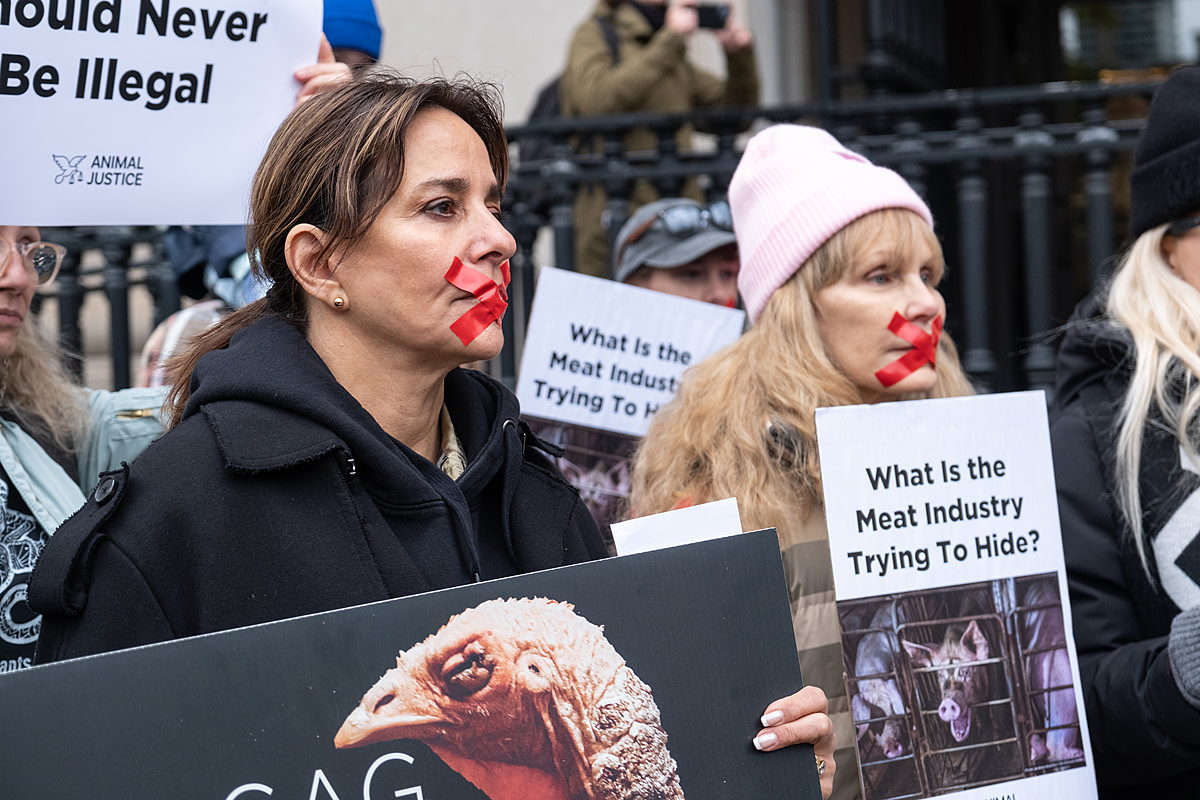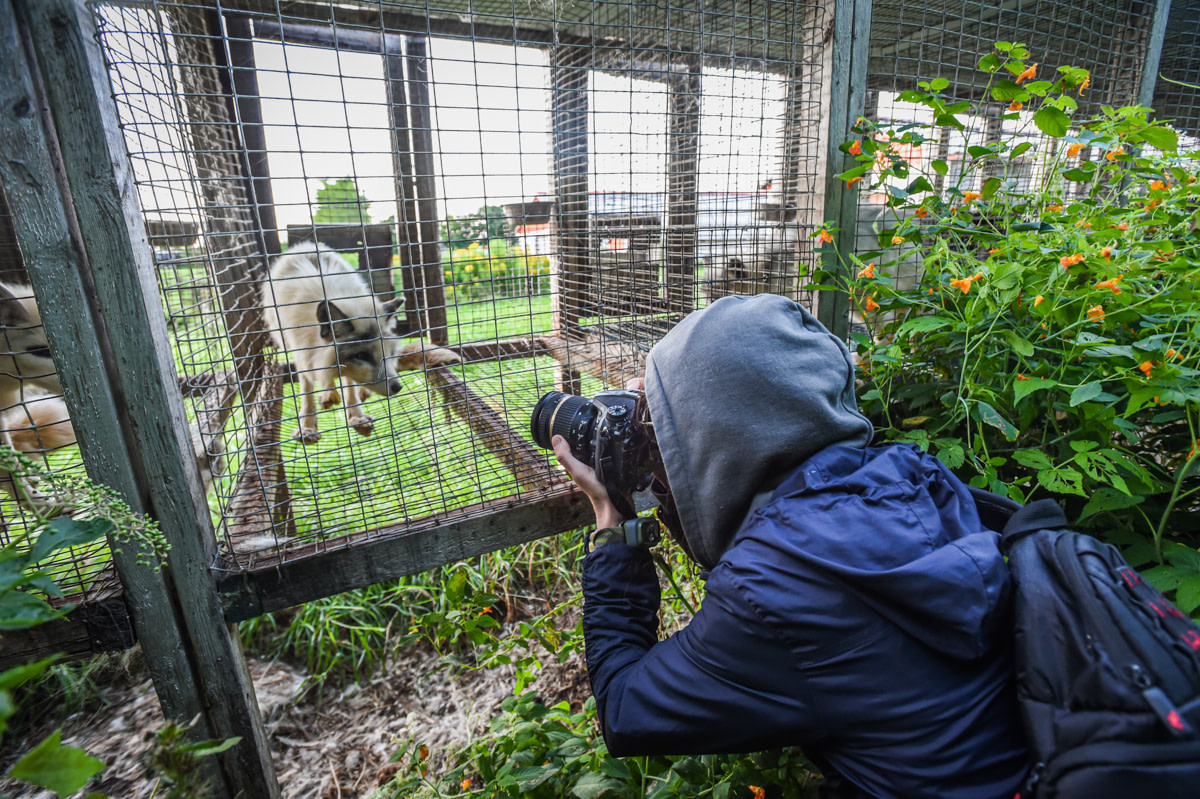Our Public Statement on Canada’s Ag-Gag Bill C-275
On November 29, Canada’s House of Commons passed Bill C-275, a federal ag-gag bill that will criminalize the work of animal photojournalists exposing animal abuse on farms. The results of this vote are disheartening – for the animals, the state of photojournalism in our country and the Canadian public.

An activist holds a sign in front of a provincial courthouse to protest the Ontario ag-gag (agricultural gag) law. Red tape forms an X-shape over her mouth to represent the silencing of whistleblowers. Superior Court of Justice, Toronto, Ontario, Canada, 2023. Ira Moon / Animal Justice / We Animals Media
As an organization of 100+ photojournalists worldwide, we have documented animal stories across the globe from bullfighting in Spain to foie gras production in France; from anti-poaching units in Uganda to fur farms in Canada.
Positive change has come of this work. Our investigations have helped expose criminal animal cruelty and shut down those facilities, educate the public, and amplify the critical work of animal advocates. Our work is of value to society. It removes our social blindfolds on how we treat other beings and is a necessary ingredient in the recipe we all seek to create a kinder world.

A photojournalist documents a calico or marble fox dwelling inside a barren wire mesh cage at fur farm in Quebec. Foxes raised on fur farms spend their entire lives in cages such as these. They are used for breeding or will eventually themselves be killed for their fur. Canada, 2022. We Animals Media

A fox in a fur farm, who has chewed off her tail and a leg. Canada, 2014. Jo-Anne McArthur / #MakeFurHistory / We Animals Media

A sick monkey in quarantine at a macaque breeding facility. Lao People’s Democratic Republic, 2011. Jo-Anne McArthur / We Animals Media

Frozen tigers found in a freezer during an SPCA inspection at a roadside zoo. Canada, 2018. We Animals Media
Every year, more than 800 million land animals are slaughtered for food in Canada. The Canadian public has the right to know how these animals live and die. With some of the weakest animal protection laws in the Western world, undercover video footage has been instrumental in exposing the mistreatment and abuse of animals on farms across Canada.
Just last week, our colleagues at Animal Justice exposed horrifying and illegal conditions at Excelsior Pig Farm in British Columbia. This was the third time this farm had been exposed for such brutal conditions: dead and rotting pigs, animals kicked in the stomach and face, water troughs that appear to be filled with feces and blood, and pigs with hernias, bloody scratches, open wounds, and leg injuries. And yet, Excelsior has never faced legal consequences.

Curious piglets look at one another from inside a small pen. The pig on the right is ill and too thin. At this farm, there are no windows facing the exterior and the pigs live in darkness. Canada, 2020. Jo-Anne McArthur / We Animals Media

Dairy cows, many with full udders, arrive at a Toronto-area slaughterhouse in a filthy transport truck. Canada, 2021. Louise Jorgensen / Animal Sentience Project / We Animals Media

Two mink at a fur farm stare out through the wire mesh of a barren cage. Their tiny enclosure contains no nest or bedding. Canada, 2022. We Animals Media

Sows look out from gestation crates at an industrial pig farm in Quebec. Canada, 2022. Jo-Anne McArthur / We Animals Media
Ag-gag laws protect powerful corporations, and criminalize whistleblowers. The work of whistleblowers is critical in a democratic and just society to expose unethical practices that the public may not be aware of. There should be no exception to this principle for agriculture industries.
“Ag-gag turns the attention towards journalists and activists who hope to expose animal cruelty, and away from the cruelty itself. This reinforces Canadian misconceptions that cruel farm practices occur elsewhere and not here. They occur everywhere.” – Jo-Anne McArthur, We Animals Media Founder & Animal Photojournalist

An activist documents conditions for hens in an egg-laying barn. Spain, 2017. Jo-Anne McArthur / Animal Equality / We Animals Media
In Canada, we have a frightfully long way to go in giving animals even the most basic of protections. The censoring of photojournalists and whistleblowers only further sweeps Canada’s systemic abuse issues under the rug.
Thank you to the thousands of supporters and animal rights advocates in Canada and around the world who have been taking action to stop this dangerous law. Subscribe to our newsletter or follow us on social media to stay updated with the latest news on this issue and the actions you can take.
More like this from We Animals Media:
Raising Animal Issues to EU Parliament
by We Animals Media | Apr 26, 2023
In The Field: Moving Animals
by We Animals Media | Jan 28, 2021



